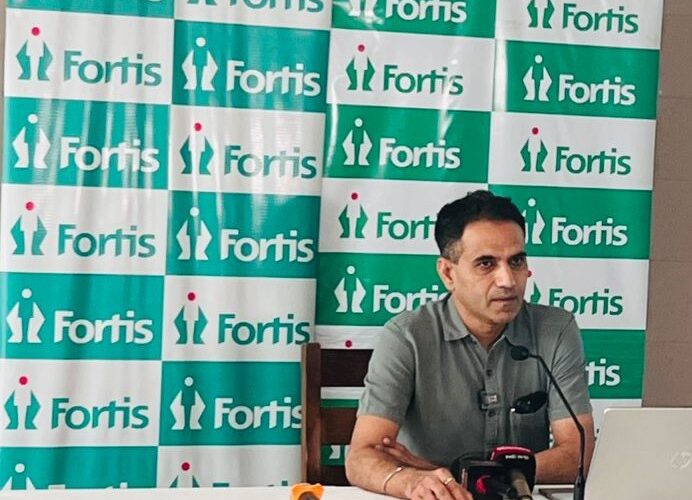#FortisMohali #RoboticSurgery #HerniaTreatment #DaVinciXi #MinimallyInvasiveSurgery #HealthcareInnovation
Delay in treatment could have resulted in life-threatening complications
Chandigarh: In a significant breakthrough in minimally invasive healthcare, Fortis Hospital Mohali has successfully treated several elderly patients with complex hernias using the world’s most advanced 4th Generation Robot – Da Vinci Xi. Doctors at the Department of General and Minimal Invasive Surgery (Laparoscopic and Robotic) highlighted that in all such cases, timely surgical intervention proved crucial, as even minor delays could have escalated into severe, life-threatening complications.
Case 1: 80-year-old man with recurrent inguinal hernia
One of the most striking cases involved an 80-year-old male patient, who had been suffering from acute abdominal pain, swelling, and rapid heartbeat. He had previously undergone hernia surgery, yet continued to face recurrent infection and worsening symptoms over time. Despite visiting multiple hospitals, doctors advised against repeat surgery citing his advanced age and fragile health condition.
Unable to endure the pain and discomfort, the patient eventually consulted Dr. Iqbal Singh, Senior Consultant, Laparoscopic and Robotic Surgery at Fortis Hospital Mohali. After a thorough examination, Dr Singh diagnosed him with a Recurrent Inguinal Hernia – a condition where tissues protrude through a weakened section of the abdominal wall, commonly in the groin area or near a previous surgical repair site.
According to Dr Singh, any delay in surgical correction would have likely caused intestinal obstruction, a blockage that prevents food and fluids from passing through the intestines – a complication that can quickly become fatal if untreated.
Despite the complexities of the case, Dr Singh proceeded with robot-assisted hernia repair surgery using the Da Vinci Xi robotic platform. The surgery was highly successful. The patient had a smooth recovery, was discharged the next day, and is now living a healthy, normal life.
Case 2: 88-year-old woman with incisional hernia and gallstones
In another critical case, an 88-year-old woman presented with a large incisional hernia (where tissue protrudes through a surgical scar) along with complicated gallstone disease. Her dual condition made the case particularly challenging, given her age and overall frailty.
Dr Singh and his team undertook a robot-assisted incisional hernia repair in combination with a robot-assisted cholecystectomy (gall bladder removal). Thanks to the precision and minimally invasive nature of robotic surgery, the patient made an excellent recovery and was discharged just three days after her procedures.
Advanced techniques at Fortis Mohali
Highlighting the hospital’s expertise, Dr Singh said,
“We have also successfully performed robot-aided TEP (Totally Extraperitoneal) repair for inguinal hernia. This technique allows surgeons to treat hernias without entering the abdominal cavity, which significantly reduces the chances of intra-abdominal complications. Such advanced, world-class procedures are offered only at select centres in India, and Fortis Mohali is proud to be one of them.”
Benefits of robot-assisted surgery
Robotic technology has revolutionized minimally invasive surgery, making it especially valuable for elderly patients and those with high surgical risks. Dr Singh elaborated on its advantages:
-
Enhanced visualization: The system provides surgeons with a high-definition, 3D view of the operative field through a special camera inserted into the patient’s body.
-
Greater precision: Robotic arms can rotate 360 degrees, offering greater dexterity than the human hand, allowing surgeons to perform delicate movements with unparalleled accuracy.
-
Minimal trauma: Robotic surgery results in reduced blood loss, less tissue damage, and fewer complications compared to conventional surgery.
-
Faster recovery: Patients typically experience shorter hospital stays, quicker healing, and a faster return to daily activities.
A ray of hope for elderly patients
The cases at Fortis Mohali underscore how robotic surgery is giving elderly patients with complex conditions a new lease of life. Traditional open or laparoscopic surgeries in such age groups often carry higher risks, but the minimally invasive robotic approach makes advanced surgical care safer and more effective.
Fortis Mohali leading the way
Fortis Hospital Mohali has consistently been at the forefront of adopting cutting-edge surgical technologies. By leveraging the capabilities of the Da Vinci Xi Robot, the hospital is not only treating highly complicated cases but also setting new standards for safe, minimally invasive surgery in India.
As Dr Singh emphasized, “Robotic surgery is the future of healthcare. It bridges the gap between human expertise and technological innovation, ensuring better outcomes, especially in high-risk patients. At Fortis Mohali, our mission is to provide world-class treatment options that improve both the quality and longevity of our patients’ lives.”
Key Takeaways
-
Elderly patients with complex hernias successfully treated using Da Vinci Xi Robot at Fortis Mohali.
-
Timely intervention was critical; delay could have caused life-threatening complications.
-
Robot-assisted surgery offers higher precision, less blood loss, reduced complications, shorter hospital stays, and faster recovery.
-
Fortis Mohali emerges as a leading centre for advanced robotic surgeries in India.
Suggested Hashtags
#FortisMohali #RoboticSurgery #HerniaTreatment #DaVinciXi #MinimallyInvasiveSurgery #HealthcareInnovation

